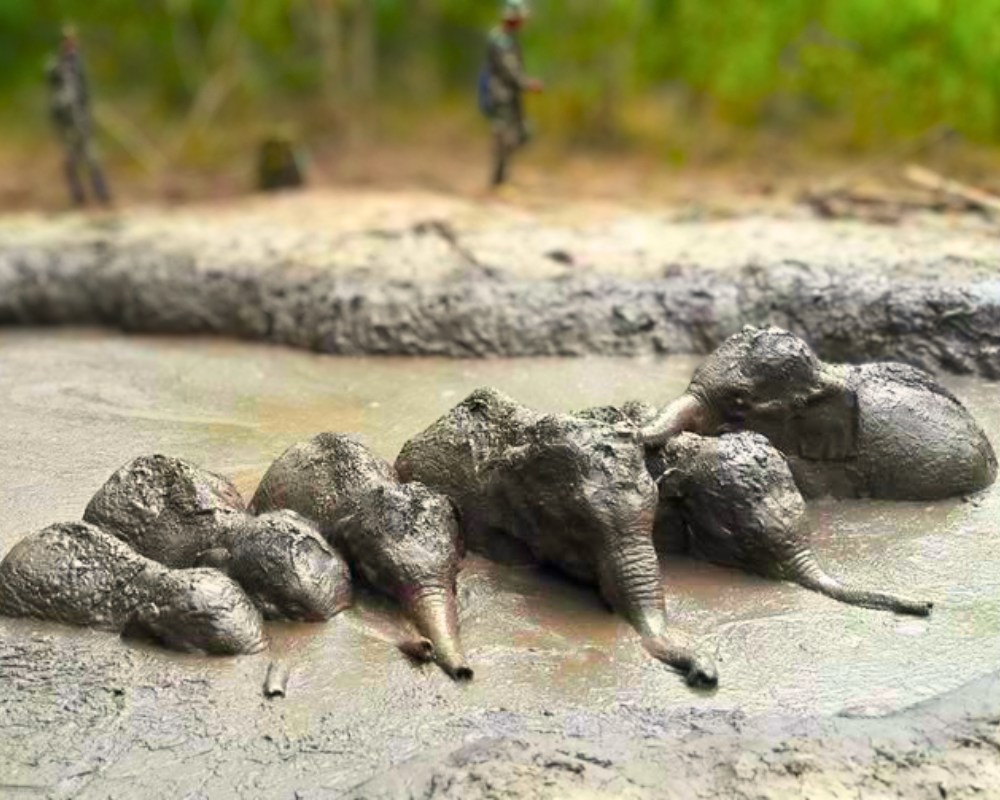A heartwarming nature story unfolded in Thailand’s Thap Lan National Park when park rangers discovered six baby animals — wild elephants — trapped in thick mud. Their quick thinking and dedication turned a near-tragedy into a touching reunion between elephant calves and their herd.
Discovery of the Stuck Elephants
The rangers were alerted to unusual noises coming from a muddy pit. On arrival, they found six baby elephants lined up helplessly, covered in mud and struggling to move. Each calf was trapped deep enough that escape without help was impossible.
Nearby, the parent elephants stood at a distance, visibly anxious and unwilling to leave. The adult herd’s behavior showed clear signs of distress, trumpeting and pacing while waiting for their young to be freed.
The Overnight Watch
Without the proper tools for rescue, the rangers made the critical decision to stay through the night. One ranger stayed close to monitor the calves, ensuring predators would not approach. The others arranged for digging equipment to arrive by morning.
This act of patience and coordination reflects the rangers’ respect for wild nature. Intervening too aggressively could have scared the adult elephants or injured the calves. Instead, they maintained a careful balance between caution and urgency.
Related read: Full Story: Man Loses 360 Pounds Naturally – Internet Rallies to Support His Next Step
The Morning Rescue Operation
As dawn broke, the team began digging a gradual slope into the mud pit — a ramp strong enough for the young elephants to climb. The process took several hours of steady effort.
When the first calf tested the ramp, the mud held firm. One by one, the six elephants climbed out, guided by instinct and the calls of their mothers. The moment the final calf reached solid ground, the entire herd gathered, trumpeting loudly — a clear sign of relief and joy.
Witnesses reported that the herd stayed together for some time before slowly disappearing into the forest.
Why Baby Elephants Get Trapped
Mud pits in tropical regions can form suddenly during heavy rain. These pits may appear solid but collapse under weight. Young elephants, lighter yet inexperienced, often follow adults near such areas. A few wrong steps can lead to entrapment.
In wild nature, incidents like this highlight how survival depends on awareness and teamwork — both among animals and between humans who protect them.
The Rangers’ Effort and Dedication
Park rangers in Thailand often face tough conditions. They work long hours to protect endangered species and maintain natural habitats. Their success in this case demonstrates effective wildlife management and compassion.
By saving the baby elephants, they not only preserved six lives but also reinforced the importance of human responsibility toward the environment.
Lessons from the Rescue
-
Teamwork matters. Both elephants and rangers relied on cooperation to succeed.
-
Preparation saves lives. Having rescue tools and training ready is vital in national parks.
-
Respect for wildlife. The rangers avoided causing panic, ensuring a safe reunion.
-
Awareness protects. Learning how animals interact with their habitat prevents future accidents.
This event is a reminder that conservation is about daily vigilance, not just emergency action.
Further reading: Full Story: Science Confirms Kelly Brook’s “Perfect” Body – But the Real Message Is Bigger Than Beauty
The Outcome
After the rescue, park staff observed the calves walking normally. None appeared injured. The herd soon disappeared into the dense forest, symbolizing freedom and survival.
Such nature stories highlight the delicate balance between wildlife and human action. Protecting habitats, ensuring safety, and minimizing human-wildlife conflict are key to preserving the next generation of animals like these young elephants.



